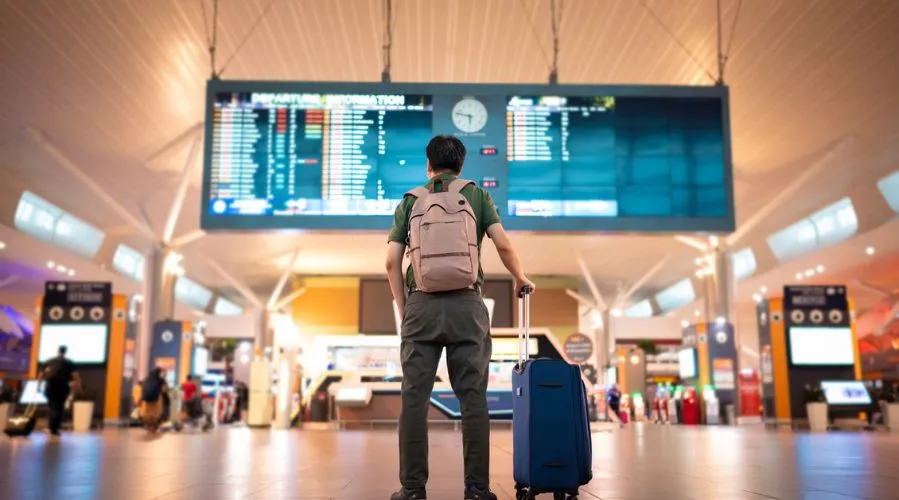If you’re planning a trip to one or more of the 29 countries in the Schengen zone, then you might need a Schengen visa. And this includes Indian passport holders, citizens of India who are permanent residents of the U.K., Australia, Canada, and the U.S., and Indian Green Card holders. Below is some useful info to help you apply.
- How do I apply for a Schengen Visa from India?
- How much does a Schengen Visa cost in India?
- What documents do I need to apply for a Schengen Visa from India?
- Do I need travel insurance when applying for a Schengen Visa from India?
- Why choose AXA Schengen Insurance?
- How do I book my Schengen Visa appointment if I live in India?
- How long does it take to process my Schengen Visa from India?
- How to apply for specific Schengen countries’ Visas from India
How do I apply for a Schengen Visa from India?
The Schengen visa application process is similar in most countries. First, you’ll need to figure out what type of Schengen Visa you need. This will depend on the purpose and length of your trip, as well as how many times you plan to visit your country (or countries) of choice.
The standard Schengen Visa — aka a short-stay visa — is issued for trips lasting up to 90 days. Longer stays will require a work or study visa. And if you plan on traveling to the Schengen Area regularly, you’ll need to be issued a multiple-entry visa.
Whichever type of Schengen Visa you choose, you must apply for it no more than six months and no fewer than 15 days before your trip. However, It’s best to give yourself at least three weeks before your date of departure — in case there are any delays in the processing of your application.
Once you know which visa you need, you’ll need to get all the necessary paperwork together (more on that below). Then you fill out and submit an application. And then you’ll need to attend an interview at the appropriate consulate, embassy, or visa application center.
How much does a Schengen Visa cost in India?
Schengen Visa costs are universal too.
A Schengen Visa from India for one adult, therefore, costs €80 — or around ₹7,080. The same rate applies to children from 12 to 18 years old.
For children from 6 to 11 years old, the rate is €40.
And for children under 6 years of age, the Schengen Visa is free.
In certain cases, the Schengen visa fee may also be waived for participants (aged 25 years or less) in seminars, conferences, sporting, cultural, or educational events, students and teachers on study or training trips, and researchers travelling for the purpose of scientific research.
Also keep in mind that — depending on where and how you apply for your particular visa — you’ll usually have to pay certain administrative fees. And these fees are typically not reimbursed in the event that your visa is refused.
What documents do I need to apply for a Schengen Visa from India?
To apply for a Schengen Visa from India, you will need the following:
- A Schengen Visa application form
- Two recently taken passport-style photos
- An Indian passport (or other travel documents) no older than 10 years and valid for at least three months after your departure date from the Schengen Area
- One copy of your passport’s data page (A4 size copy)
- A leave letter from your employer and/or employment contract (if employed)
- A copy of your Indian business license and company bank statement (if self-employed)
- A no-objection certificate from your school or university and proof of enrolment (if student)
- A travel and medical insurance certificate (covering you up to costs of €30,000)
- Your travel itinerary
- Proof of accommodation (for your entire stay in the Schengen area)
- Proof of your civil status (i.e., marriage certificate, birth certificate of children, death certificate of spouse, ration card if applicable, etc.)
- Proof of financial status:
- If employed: payslips of the past three months/employment contract
- If self-employed: Certificate of Proprietorship or other proof of ownership (proof of land title, proof of income from agriculture (sales form), etc.)
- Personal original bank statement of the past three months with sufficient funds
- Income Tax Return (ITR) form or Form 16 (Certificate of Income Tax deducted at the source of salary)
You may also need to provide proof of a pension or property income (if these are sources of income).
All documents need to be presented in the given order and in their original. Make sure you have copies of all your paperwork (A4 size) — in case you want to keep the originals.
And DO NOT staple any documents.
NOTE: We are doing our best to provide you with the most reliable and updated information possible. However, rules and regulations concerning visas may be modified at any time by the consulate of your country of choice. Consequently, we can not be held accountable for these changes. So be sure to contact the appropriate embassy or consulate to obtain the specific terms and conditions in effect at the moment of the submission of your visa application.
Do I need travel insurance when applying for a Schengen Visa from India?
Yes. In order to be approved for a Schengen Visa, you will need travel insurance. Your plan must cover you across the entire Schengen region (not only in the countries you plan to visit) and throughout the entire duration of your trip. You’ll also need a minimum coverage of at least €30,000.
Why choose AXA Schengen Insurance?
AXA offers three comprehensive travel insurance plans for Indian nationals travelling to the Schengen zone (and beyond).
Our Basic Travel Insurance covers expenses of up to €30,000 and starts at €22 per week. Our Essential plan offers extended coverage up to costs of €100,000 and starts at €33/week. And our Annual insurance, starting from €349,9 per year, allows you multiple entries to the Schengen zone from India (or anywhere else).
All three AXA plans meet the necessary requirements for obtaining a Schengen Visa from India. And our travel insurance certificate can be instantly downloaded (and/or printed) online.
Moreover, if you are refused a visa, AXA will refund your fees in most circumstances. We’ll only ask that you provide official documentation explaining the reasons why your visa was refused by the relevant embassy, consulate, or visa application center.
How do I book my Schengen Visa appointment if I live in India?
Applicants living in India must book an appointment to be interviewed in order to obtain their Schengen visa. They must then attend the interview in person — with all the necessary documents above, as well as for biometrics collection (i.e., fingerprints and digital photography). The interview is held at a consulate, embassy, or visa application center.
Some countries use outsourced visa application centers located in most major Indian cities. For example, France and Germany use the company VFSGlobal, which has centers in over a dozen cities — including Mumbai, Pune, Puducherry, Chennai, Jalandhar, Jaipur, Hyderabad, Goa, New Delhi, Kolkata, Bengaluru, and others.
You can learn more about where to book an appointment for a Schengen visa in India here.
How long does it take to process my Schengen Visa from India?
Schengen embassies/consulates in India typically require you to schedule an appointment 4-6 weeks in advance. The applications usually take around two weeks to process. However, during busier periods (and depending on your particular situation) it can take up to a month or two. So it’s best to apply early. You can apply up to 6 months in advance.
Learn more here.
How to apply for specific Schengen countries’ Visas from India
Millions of Indian passport holders visit Schengen countries each year, and getting a Schengen Visa from India is generally relatively painless. Some of the easier countries to apply to are Lithuania, Estonia, Latvia, Slovakia, Switzerland, Luxembourg, Greece, and Iceland. Meanwhile, Sweden, Norway, and France have among the highest rejection rates.
Below is a list of specific Schengen countries you can apply for (with step-by-step guidelines):
- Apply for Switzerland visa from India
- Apply for Spain visa from India
- Apply for Germany visa from India
- Apply for Greece visa from India
- Apply for France visa from India
- Apply for Czech Republic visa from India
- Apply for Belgium visa from India
- Apply for Italy visa from India
- Apply for Netherlands visa from India
- Apply for Portugal visa from India
- Apply for Denmark visa from India
- Apply for Iceland visa from India
Related Articles on Schengen visas for Indian citizens
How to apply for Schengen visa in other countries ?
- How to apply for a Schengen Visa from Thailand
- How to apply for a Schengen Visa from China
- How to apply for a Schengen Visa from Indonesia
- How to apply for a Schengen Visa from the Philippines
- How to apply for a Schengen Visa from Jamaica
- How to apply for a Schengen Visa from Peru
- How to apply for a Schengen Visa from Mexico
- How to apply for a Schengen Visa from Colombia
- How to apply for a Schengen Visa from the U.K
- How to apply for a Schengen Visa from the U.S.A
- How to apply for a Schengen Visa from Turkey
- How to apply for a Schengen Visa from Saudi Arabia
FAQ
What should I do if my visa gets refused?
If your visa is refused you have the right to appeal to the authorities in the Schengen member state where you applied.
What if the Schengen country you intend to visit has no embassy or consulate in India?
Although most countries are represented in India - those without an embassy will be represented by another country’s consulate - which you should apply to.
Which consulate should I apply to if I am traveling to multiple countries?
You should apply to the country where you are planning to spend most of your trip - or if staying an equal amount of days in two countries - the one you plan to enter first.
AXA already looks after millions of people around the world
With our travel insurance we can take great care of you too
AXA Schengen's Travel Insurances

AXA Schengen Basic
AXA Schengen Basic is perfect to obtain your Schengen visa. This travel insurance meets all the requirements demanded, covers you in all the countries of the Schengen Area as well as 4 European microstates (Andorra, Vatican City, Monaco and San Marino).

AXA Schengen Essential
AXA Essential is perfect to obtain your Schengen visa. It provides coverage in all the Schengen countries + the European microstates + all the EU countries (including UK, Cyprus, and the Republic of Ireland). And you get additional guarantees compared to AXA Schengen Basic.

AXA Schengen Annual
AXA Annual is perfect to obtain your Schengen visa. This annual travel insurance is ideal for those who often travel to Europe as well as multiple-entry Schengen visa holders. You get the same guarantees as AXA Schengen Annual for different countries during 90 days.


